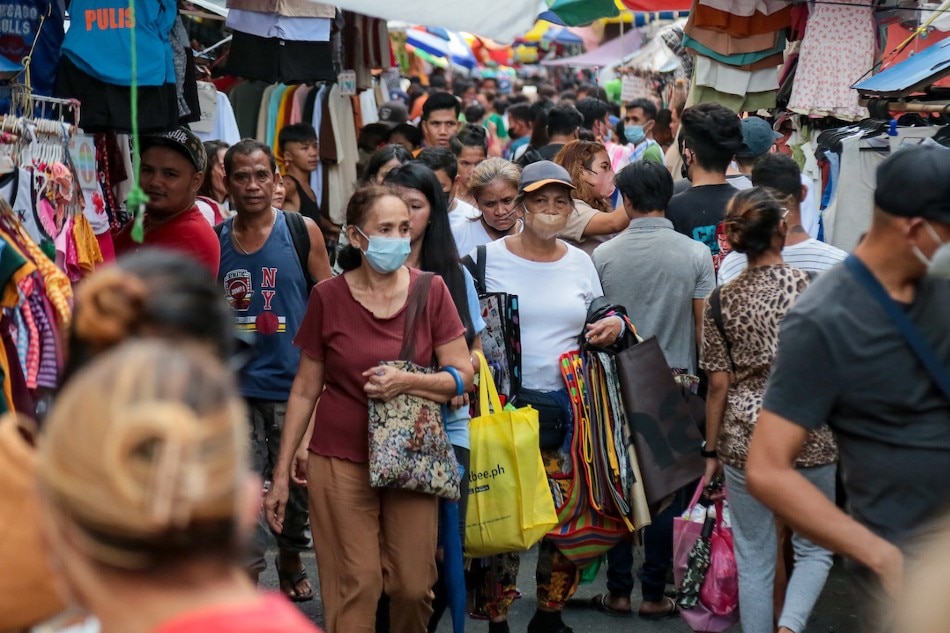WHO estimates 90 pct of world population have some resistance to COVID-19 | ABS-CBN
ADVERTISEMENT

Welcome, Kapamilya! We use cookies to improve your browsing experience. Continuing to use this site means you agree to our use of cookies. Tell me more!
WHO estimates 90 pct of world population have some resistance to COVID-19
WHO estimates 90 pct of world population have some resistance to COVID-19
Agence France-Presse
Published Dec 03, 2022 09:54 AM PHT
GENEVA - The World Health Organization estimated Friday that 90 percent of the world population now had some resistance to COVID-19, but warned that a troubling new variant could still emerge.
GENEVA - The World Health Organization estimated Friday that 90 percent of the world population now had some resistance to COVID-19, but warned that a troubling new variant could still emerge.
Gaps in vigilance were leaving the door open for a new virus variant to appear and overtake the globally dominant omicron, said WHO director-general Tedros Adhanom Ghebreyesus.
Gaps in vigilance were leaving the door open for a new virus variant to appear and overtake the globally dominant omicron, said WHO director-general Tedros Adhanom Ghebreyesus.
"WHO estimates that at least 90 percent of the world's population now has some level of immunity to SARS-CoV-2, due to prior infection or vaccination," said Tedros, referring to the virus that causes COVID-19 disease.
"WHO estimates that at least 90 percent of the world's population now has some level of immunity to SARS-CoV-2, due to prior infection or vaccination," said Tedros, referring to the virus that causes COVID-19 disease.
"We are much closer to being able to say that the emergency phase of the pandemic is over -- but we're not there yet," he told reporters.
"We are much closer to being able to say that the emergency phase of the pandemic is over -- but we're not there yet," he told reporters.
ADVERTISEMENT
"Gaps in surveillance, testing, sequencing and vaccination are continuing to create the perfect conditions for a new variant of concern to emerge that could cause significant mortality."
"Gaps in surveillance, testing, sequencing and vaccination are continuing to create the perfect conditions for a new variant of concern to emerge that could cause significant mortality."
Last weekend marked one year since the organization announced omicron as a new variant of concern in the COVID-19 pandemic, Tedros noted.
Last weekend marked one year since the organization announced omicron as a new variant of concern in the COVID-19 pandemic, Tedros noted.
It has since swept round the world, proving significantly more transmissible than its predecessor, delta.
It has since swept round the world, proving significantly more transmissible than its predecessor, delta.
Tedros said there were now more than 500 highly transmissible omicron sub-lineages circulating -- all able to get around built-up immunity more easily, even if they tended to be less severe than previous variants.
Tedros said there were now more than 500 highly transmissible omicron sub-lineages circulating -- all able to get around built-up immunity more easily, even if they tended to be less severe than previous variants.
Countries have reported 6.6 million deaths to the WHO, from nearly 640 million registered cases. But the UN health agency says this will be a massive undercount, and unreflective of the true toll.
Countries have reported 6.6 million deaths to the WHO, from nearly 640 million registered cases. But the UN health agency says this will be a massive undercount, and unreflective of the true toll.
ADVERTISEMENT
Tedros said more than 8,500 people were recorded as having lost their lives to COVID last week, "which is not acceptable three years into the pandemic, when we have so many tools to prevent infections and save lives".
Tedros said more than 8,500 people were recorded as having lost their lives to COVID last week, "which is not acceptable three years into the pandemic, when we have so many tools to prevent infections and save lives".
rjm/jj
rjm/jj
© Agence France-Presse
© Agence France-Presse
WATCH
Read More:
COVID19
COVID-19
coronavirus
omicron
WHO
World Health Organization
coronavirus resistance
COVID19 resistance
overseas
Tedros Adhanom Ghebreyesus
ADVERTISEMENT
ADVERTISEMENT



